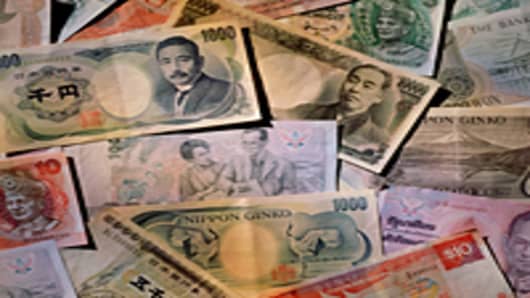Asian currencies have had a good run so far this year against the U.S. dollar, and analysts expect further upside as President Barack Obama's re-election signals an end to China bashing and raises hopes of further monetary easing.
Obama's Republican challenger Mitt Romney had said he would label America's second largest trading partner a currency manipulator on his first day in office and also indicated that the Federal Reserve Chairman Ben Bernanke may not get another term.
But these risks are now over, said forex analysts, and Asian currencies should benefit from the end of political uncertainty.
Nomura currency strategists Craig Chan and Prateek Gupta wrote in a note on Wednesday that the risk of conflict between U.S. and China was now gone thanks to the Obama win, and this should pave the way for the gradual appreciation of the yuan .
The yuan has appreciated about 1 percent against the greenback so far this year, and is now trading at 6.24.
"With Obama winning a second term, the risk of Sino-U.S. conflict and potential yuan depreciation - historical retaliation behavior from China - has been lowered," Nomura strategists wrote in the report. "Although President Obama and the U.S. Treasury will continue to press China for greater yuan liberalization and appreciation, the pressure is likely to be more diplomatic."
Relations between China and the U.S. are expected to stay strong over the medium term, they added. During Obama's first four years in office, U.S. exports to China have almost doubled and the yuan has strengthened nearly 10 percent, Nomura said.
Besides easing of tensions between the world's top two economies, the prospect of further easing by the Federal Reserve under the Obama administration will also benefit Asian currencies, analysts said.
"Obama's re-election to the White House has alleviated market fear of an earlier end to quantitative easing, which should be positive for Asian currencies," said Gaurav Garg, analyst of Asia forex strategy with Citi in Singapore.
Focus Shifts to Asia
With some of the uncertainty out of the way, attention can shift to other positive news for Asia, including a Chinese economic recovery, strategists said.
"We are generally quite bullish on Asian currencies, not just because of what's happening with the Fed and the U.S., but also because of Asia," said Thio Chin Loo, senior currency strategist with BNP Paribas in Singapore.
"With the Chinese leadership change this month, they may smooth out the hiccups that we have seen in the country's growth this year, and this will be positive for Asia."
[Read more: Changing Chinapackage]
A key beneficiary in Asia of China's recovery and a more stable U.S. will be the Korean won, according to Nizam Idris, head of strategy, fixed income and currencies with Macquarie Bank.
"The won can do really well if China shows a strong recovery. The currency also remains highly sensitive to global growth so any stability there will be good," Idris said. "I see a lot of value there waiting to be unlocked."
The won has appreciated 5.7 percent against the greenback since the start of 2012.
As for other currencies in the region, Thio favors the Malaysian ringgit and Philippine peso - which have so far this year risen 3.4 percent and 6.8 percent, respectively against the U.S. dollar - to benefit from capital flows from more quantitative easing by the Fed.
However, any rise in Asian currencies may be capped by concerns over the "fiscal cliff," according Macquarie's Idris.
The "fiscal cliff" refers to the combination of tax hikes and spending cuts that are due to kick in at the start of 2013 unless Congress takes action. Most economists agree the impending fiscal tightening would result in a recession.
"You have to balance that out with the fear of the 'fiscal cliff,'" Idris said. "Easing is only a cushion and the 'fiscal cliff' still has to be averted. And it will depend on whether Obama can become less aloof and garner bipartisan support."
Stronger currencies in Asia may also complicate policy making in the region, with central banks likely to intervene to try to curb appreciation, as seen in major moves by the Hong Kong Monetary Exchange last month.
-By CNBC's Jean Chua.


